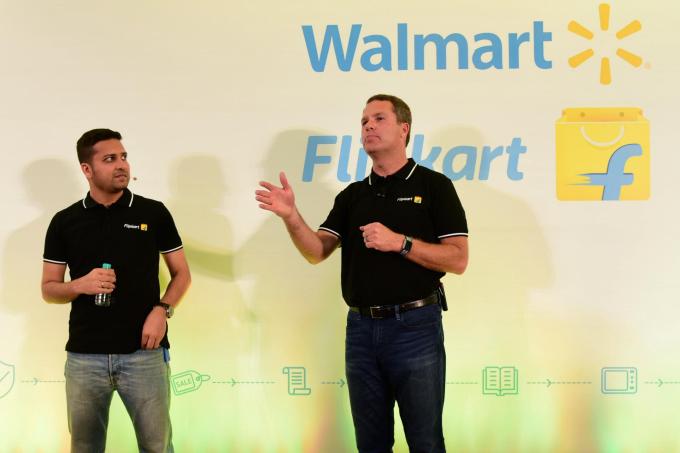The Indian government is playing the role of festive party pooper for Walmart and Amazon after it announced new regulations that look set to impede the U.S. duo’s efforts to grow their businesses in India.
Online commerce in the country is tipped to surpass $100 billion per year by 2022 up from $35 billion today as more Indians come online, according to a report co-authored by PwC. But 2019 could be a very different year after an update to the country’s policy for foreign direct investment (FDI) appeared to end the practice of discounts, exclusive sales and more.
The three main takeaways from the new policy, which will go live on February 1, are a ban on exclusive sales, the outlawing of retailers selling products on platforms they count as investors, and restrictions on discounts and cashback.
Those first two clauses are pretty clear and will have a significant impact on Amazon — which has pumped some $5 billion into India — and Walmart, which forked out $16 billion to buy India-based Flipkart.
Both online retailers have been able to make a splash by tying up with brands for exclusive online sales, particularly in the smartphone space where, for example, Amazon has worked with Xiaomi and Flipkart has collaborated with Oppo. The new guideline would appear to end that practice, while adding further restrictions to complicate relationships with vendors. From February, brands will be forbidden from selling more than 25 percent of their sales via any single e-commerce marketplace.

Walmart bought Flipkart for $16 billion, but already both founders of the Indian company have left [Photo by AFP/Getty Images]
Cloudtail India (a 49:51 JV between Amazon and Catamaran Ventures) is Amazon’s biggest seller while another major one is Appario Retail, a collaboration with Patni Group. Together, both sell more than 25 percent of product on Amazon, use exclusive deals and are part-owned by Amazon. That’s three strikes.
Those rules will have Amazon and Walmart-Flipkart working to find alternatives, but there’s more with restrictions on discounts and cashback offers, which could massively cramp the appeal of online commerce, which has been to undercut brick and mortar retailers with heavy subsidies.
Here’s the relevant part of the note:
E-commerce entities providing marketplace will not directly or indirectly influence the sale price of goods or services and shall maintain level playing field…
Cash back provided by group companies of marketplace entity to buyers shall be fair and non-discriminatory.
Exactly what constitutes a “level playing field” or “fair” may be open to interpretation, but clearly this update gives offline retailers a route to protest pricing on online retail sites.
The first thought is that these new updates are focused on the core business model tenants that make e-commerce what it is today.
“It will kill competition and there will be nothing for online retailers to differentiate on,” Amarjeet Singh, a partner at KPMG, href="https://qz.com/india/1508340/indias-new-e-commerce-fdi-rules-may-hurt-amazon-flipkart/"> told Quartz in a comment.
The new regulation is widely seen as a response to concerns from smaller sellers, who feel marginalized and powerless compared to larger organizations. Now, with capital-intensive policies such as discounts, exclusive sales relationships and strategic investment off the table, smaller players will gain a foothold and be able to do more from e-commerce, that’s according to Kunal Bahl, CEO of Snapdeal — a niche e-commerce firm that once competed head-to-head with Flipkart and Amazon.
It’s shaping up to be a very different year for e-commerce in India in 2019.
from TechCrunch https://tcrn.ch/2Ri7n8N
via IFTTT
Comments
Post a Comment